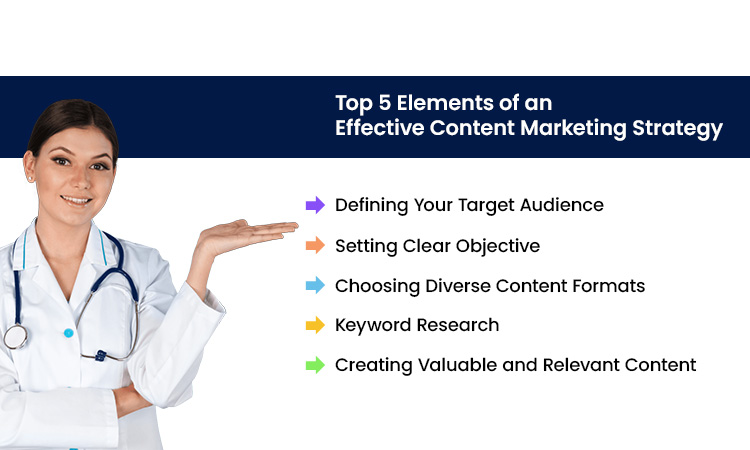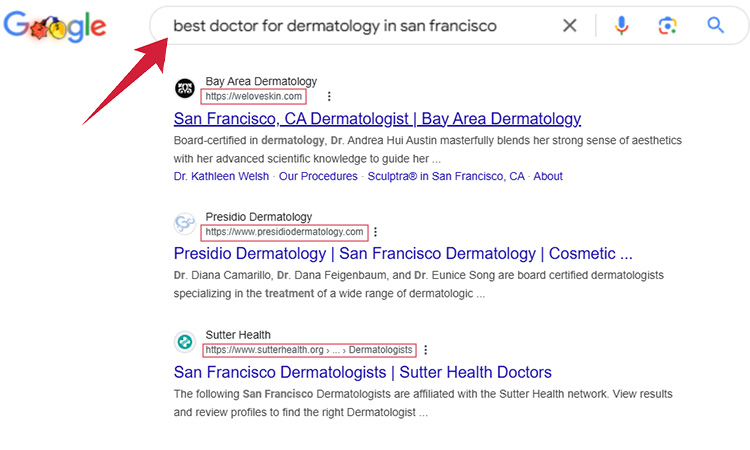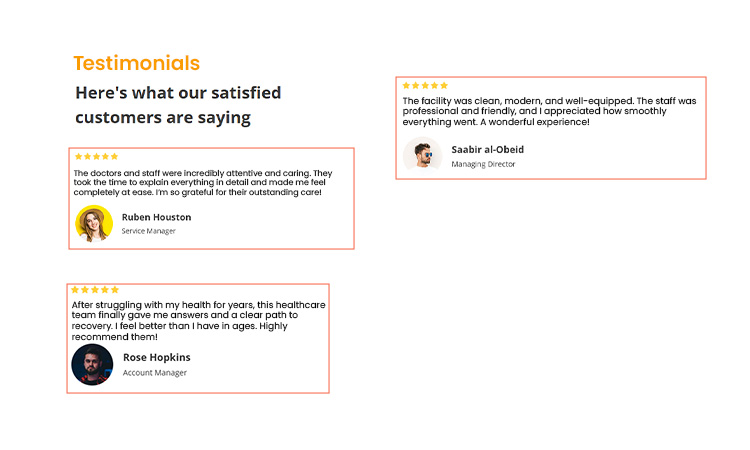In today’s digital age, doctors are discovering that search engine optimisation and digital marketing aren’t just buzzwords—they’re essential tools for connecting with patients. You can create informative blog posts and educational content; healthcare entities can improve their search engine rankings while genuinely helping patients understand complex medical topics. Think of it as a win-win: doctors can showcase their skills and educate patients while making their practices more visible online. It’s about building trust through valuable content that answers real healthcare questions.
What is Content Marketing for Doctors?
Content Marketing for Doctors is a strategic approach to creating and sharing valuable, educational healthcare information online. Healthcare content marketing is a strategic method of creating high-quality content that attracts prospective patients. Combining digital marketing strategies with social media marketing assists healthcare practices in boosting patient engagement and lead generation, enhancing their overall online presence. For example, a paediatrician might create blog posts about childhood vaccination schedules or YouTube videos explaining common childhood illnesses. According to a Healthcare Marketing Report, physicians who implement content marketing strategies see a 45% increase in patient acquisition and a 60% improvement in patient engagement rates.
Why Content Marketing Is Important for Doctors?
Content marketing is a powerful tool for doctors to educate, engage, and attract patients. Effective Content marketing services for doctors help to create content pages on health topics and medical issues. This helps other providers rank higher online, attract more patients, and establish trust through valuable, informative resources.
The American Medical Association reports that 72% of patients use online resources to research medical information.
Creating valuable, trustworthy content, doctors can:
- Ensure the legitimacy of the medical field.
- Gain the trust of your patients.
- Increase your internet presence.
- Inform the public about health-related concerns.
- Draw in possible patients.
- Set yourself apart from the competition.
Top 5 Elements of an Effective Content Marketing Strategy for Doctors

Want to nail your medical practice’s content game? Let’s dive into the 5 crucial ingredients that’ll make your healthcare content marketing not just another prescription, but a real game-changer that connects, educates, and grows your practice.
- Defining Your Target Audience
You can use digital marketing strategies, high-quality content, and tailored social media posts; healthcare practices can engage new and current patients with customised medical marketing content centred on their demographics and interests. Consequently, doctors should consider:
- Age ranges
- Conditions of health
- Particular interests in medicine
- Patterns of online behaviour
- Location in space
- Setting Clear Objective
Search engine optimization is essential for reaching prospective patients effectively. You can create high-quality content tailored to your target audience.
Moreover, 94% of people are engaging with educational content. Therefore make very precise and relevant educational content.
Focus on enhancing online reviews, improving search engine results, and building trust to grow your healthcare business effectively.
- Education of patients
- Developing trust
- Increasing the exposure of the practice
- Creating patient questions
- Developing medical knowledge
- Choosing Diverse Content Formats
Choosing diverse content formats is crucial in online marketing for the healthcare industry. You can incorporate visuals, medical professionals can engage a broader audience. Additionally, creating content tailored for other healthcare professionals ensures better collaboration and wider reach in the industry. Notably, explore multiple formats:
- Informative blog posts
- Educational videos
- Easy-to-understand infographics
- Podcast discussions
- Social media micro-content
- Patient testimonial series
- Keyword Research
Keyword research provides a good knowledge for creating effective marketing strategies. By identifying the right keywords, you can optimize online content, boost social media engagement, and drive organic traffic. This approach helps establish thought leadership and attract a wider audience. Therefore, you can focus on:
- Keywords specific to medical conditions
- Searches for treatment procedures
- Terms associated with patient symptoms
- Questions about local healthcare
- Long-tail keywords for medicine
- Creating Valuable and Relevant Content
Creating valuable and relevant content requires content ideas that resonate with your audience. Utilize patient stories, guest blogging, and repurposing existing content. Stay up to date with trends to ensure your audience consumes content that is timely and engaging. Subsequently, develop content that:
- Respond to frequently asked medical questions
- Moreover, gives information on preventive care.
- Explains intricate medical processes
- Furthermore, provides lifestyle and health advice.
- Resolves patient concerns
Recommended Content Strategies:
- Use simple, clear language.
- Incorporate expert medical insights.
- Maintain patient confidentiality.
- Provide evidence-based information.
- Update content regularly.
Key Performance Indicators:
- Traffic to Websites
- Rates of engagement
- Conversions of patient enquiries
- Metrics for content share
- The amount of time spent on medical pages
New Developments in Trends:
- Medical explanations via video
- Interactive medical evaluations
- Experiences with personalised content
- Medical resources that are mobile-friendly
Pro Tips:
- Keep your tone professional.
- Provide references to reliable medical sites.
- Use illustrations to clarify ideas.
- Address the patient’s areas of discomfort
- Display your medical knowledge.
SEO for Healthcare Content: Best Practices
SEO isn’t just a digital marketing tactic—it’s a way to connect with patients. You can implement these best practices, doctors can enhance their online presence, attract more patients, and build a stronger reputation in their field. A well-planned content marketing strategy helps medical practices connect with new patients and engage existing patients. In today’s digital age, having an online presence is vital for healthcare professionals. Patients increasingly turn to the internet to find doctors, seek medical advice, or explore treatment options. Implementing effective local SEO strategies can significantly boost visibility and credibility, ensuring your practice stands out in a competitive healthcare landscape.
Why SEO Matters for Doctors?
You can Improving search ranks for healthcare providers is mostly dependent on search engine optimisation, or SEO. You run the danger of losing potential clients to other practices if your office is not listed on the first page of search results. For medical offices to draw in new patients, search engine optimisation is essential. You can put a few strategies into practice, such as improving search rankings, increasing online visibility, and optimising website content; you can make sure your clinic shows up in search results, which will increase patient traffic and trust. This will ultimately lead to more appointments and revenue for your practice.
Related: SEO for Doctors (Proven SEO Tips to Grow Your Medical Practice)
On-Page SEO Strategies

As a medical professional, On-page Healthcare SEO is essential for enhancing your website’s relevance and user experience. Begin with keyword optimization by researching phrases like “best doctor in [city]” or “treatment for [condition].” Use these keywords naturally in your content, titles, and subheadings.
Next, focus on meta tags: Craft compelling meta descriptions and titles to attract clicks. Include alt text for images to improve accessibility and allow search engines to understand visual content. Additionally, structure URLs, such as “www.clinicname.com/diabetes-treatment,” to signal relevance to both users and search engines.
Creating Content Aligned with Patient Search Intent
Patients often search for answers to health concerns, making content alignment with search intent crucial. Provide articles, FAQs, or blogs addressing common questions like “What are the symptoms of [condition]?” or “When should I see a specialist?” Engaging, informative, and easy-to-read content not only helps patients but also signals to search engines that your site is authoritative.
For example, if your specialization is cardiology, create content on topics like “Top Tips for Heart Health” or “Understanding High Blood Pressure.” Use transition words like “in addition,” “however,” and “for instance” to enhance readability.
Local SEO for Doctors
Local SEO ensures your practice appears in location-based searches. According to Google, 46% of searches have a local intent, so claiming and optimizing your GMB listing is indispensable.
Incorporate geo-specific keywords like “paediatrician near [city/area]” in your website content. Encourage satisfied patients to leave positive reviews, as a higher rating can improve local rankings and credibility.
Related: The Ultimate Guide to Local SEO for Doctors: Boost Your Practice’s Online Visibility
Building Trust Through Educational Content

Building trust through educational content is crucial for medical practices. Through email marketing and enhancing website content, doctors can engage site visitors, establish prominence, and develop lasting relationships with patients.
Why Educational Content is Crucial?
The foundation of the doctor-patient interaction is trust. 75% of patients, according to research, look up health-related information online before seeing a doctor. In addition to improving their reputation, this lessens the spread of false information, which can cause needless anxiety or inappropriate treatment.
Types of Educational Content
Diverse educational content caters to different patient needs. Simple health tips, such as strategies for maintaining heart health or boosting immunity, provide instant value. Additionally, simplifying medical conditions—like diabetes or hypertension—through videos, infographics, or blog posts helps patients comprehend their health better.
Using Patient-Friendly Language
In medical practices, using simple language like “high blood pressure” instead of “hypertension” improves patient comprehension. Comparisons can further reduce complex terms, enhancing engagement.
- Incorporating Patient Testimonials and Success Stories

Patient testimonials build trust, especially when shared on social media platforms. These stories, paired with a solid wellness content strategy and search engine optimisation, can draw potential patients and highlight expertise.
- Quizzes, surveys, and polls
Interactive tools such as questionnaires, quizzes, and polls greatly aid in understanding patient needs. Medical professionals can use these resources to instruct patients on subjects like food, exercise, and managing chronic illnesses.
- Real-time Q&A sessions
Patients and healthcare providers can interact in real time via live Q&A sessions on websites like Facebook Live and Instagram Live. When their complaints are swiftly handled, more than 40% of patients report feeling more satisfied, which fosters trust and promotes sustained involvement.
- Apps and Health Trackers
Patients can keep an eye on vital signals like heart rate and blood sugar levels with the use of health monitors and smartphone apps. These technologies allow patients to monitor their health and seek prompt interventions, which is why the market for health apps is expanding quickly.
- Workshops and Webinars
Patient education is aided via webinars and workshops on medical subjects such as mental health and diabetes control. These educational sessions provide patients with valuable information and resources to better manage their health conditions.
Utilizing Social Media for Patient Engagement

You can use social media marketing to improve patient engagement by combining healthcare content strategy and search engine optimization. Through reducing medical terms, doctors can attract potential patients, enhance marketing efforts, and build trust, improving the healthcare organisation’s online presence and communication with patients.
Related: Social Media Marketing for Doctors: A Step-by-Step Approach
Why Video Content Works: The Power of Visuals in Healthcare Marketing
Visual content is processed 60,000 times faster by the brain than text, making videos a compelling way to communicate complex medical information. According to HubSpot, 72% of consumers prefer learning about a product or service through videos, and healthcare is no exception. A well-crafted video can demystify medical jargon, providing clarity and reassurance. For instance, a short clip explaining a diagnostic procedure can alleviate patient anxiety.
Assessing the Performance of Your Content Marketing Initiatives

Creating a content calendar helps maintain consistent posting and ensures search engine optimization. Regularly evaluating content performance, such as engagement rates and traffic, allows you to refine strategies and enhance results, improving overall content marketing effectiveness.
- Engagement Rates: A Crucial Measure of the Effect of Content
When it comes to doctor content marketing, engagement rates are essential. To improve your approach to healthcare content marketing, use technologies such as Facebook Insights and Instagram Insights.
- Website Traffic: Increasing Awareness and Visibility
Monitoring website traffic is crucial for assessing how successfully content draws users in. Measure unique visitors, bounce rates, and pages per session with Google Analytics. Effective content marketing for doctors is a rise in traffic following the publication of a blog page.
- Creating Leads: Converting Visitors into Potential Customers
Leads can be generated from visitors through content marketing for doctors. Monitor data such as newsletter sign-ups and form submissions. CTAs are crucial for directing users towards conversion.
- Appointment Requests: A Direct ROI Metric
For marketing for doctors, appointment requests are a tangible result of content performance. Use landing pages or scheduling tools to track conversions from specific content.
- Google Analytics: Measuring Content Effectiveness
Google Analytics provides valuable insights into user behaviour. Track metrics like session duration and conversion paths to measure content effectiveness.
- Social Media Analytics: Monitoring Reach and Interaction
Social media analytics, like Facebook Insights, help monitor reach and interaction, ensuring your content reaches the right audience.
- Patient Feedback: Insights from Your Audience
Patient feedback through surveys or discussions offers valuable insights into how well content educates patients, helping refine your healthcare content marketing strategy.
Upcoming Developments in Physician Content Marketing
Content marketing for physicians will become more individualised, effective, and captivating as healthcare changes. Future healthcare marketing will be greatly influenced by technology, which will make patient interaction more personalised and interactive.
- Online consultations and telemedicine
With usage up 38 times from pre-pandemic levels, telemedicine is transforming patient involvement. To provide consultations, doctors might use digital tools like smartphone applications and video conferencing.
- AI and Tailored Content
You can tailor it to each patient’s needs; artificial intelligence (AI) will revolutionise the way that content is delivered. Tools with AI capabilities can examine patient data and recommend films or blog entries that are specifically suited to the user’s interests.
- Optimisation of Voice Search
Improving content for voice search is becoming essential for doctors. You can emphasise long-tail phrases and conversational keywords, physicians can improve visibility and ensure their content is easily discoverable.
- Content Focused on the Patient
Patient-centric content will be the main emphasis of content marketing for physicians in the future. Establishing trust and loyalty by providing relevant healthcare information that addresses patients’ concerns enhances the patient experience.
Final Takeaways
Ready to improve your healthcare organization’s online presence? With smart search engine optimisation and planned marketing for doctors, you can make a real difference in your community. Start small—try out a few ideas like creating helpful blog posts or engaging on social media. Remember, it’s not just about rankings; it’s about building meaningful relationships with your patients. When you share useful awareness, everyone benefits. The digital future of healthcare is here—why not lead the way?
Additional Resources:
- Advanced Lead Generation Strategies for Doctors and Healthcare Providers
- PPC for Doctors: The Ultimate Guide to Generating Online Leads
- The Ultimate Guide to Online Reputation Management for Doctors
- Digital Marketing for Healthcare: Top 6 Strategies for Online Success

